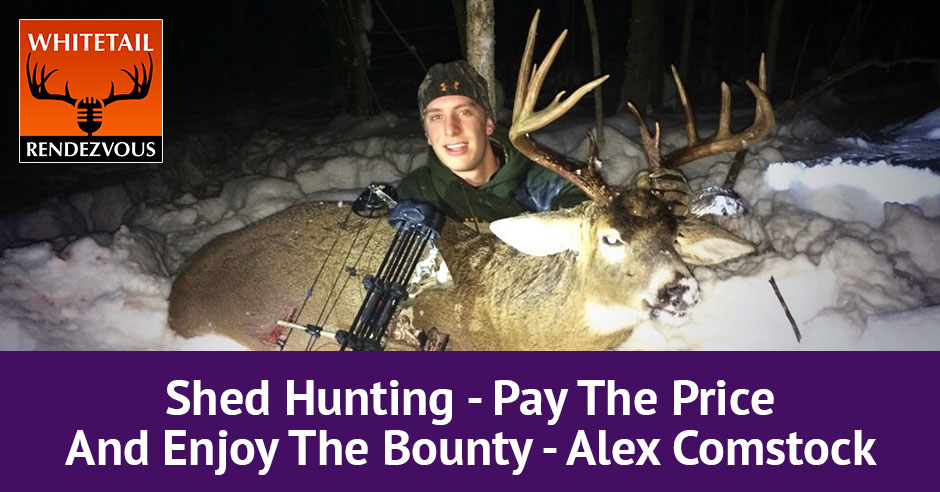
More than hunting whitetails with his bow, this episode’s guest loves writing about those experiences even more. Alex Comstock, author and founder of WhitetailDNA, shares to us how he has combined his passions for hunting and writing. For those who are looking to do the same, he shares tips and techniques on how to get into the outdoor career as a writer. Alex then lets us in on his own hunting insights, talking particularly about shed hunting, its two types, and the challenges it brings.
—
LISTEN TO THE PODCAST HERE:
Shed Hunting – Pay The Price And Enjoy The Bounty – Alex Comstock
We’re going to visit with Alex Comstock. Alex is from the Dakotas and he loves to hunt whitetails with his bow, but he even loves more writing about those experiences. He’s going to share tips and techniques on how to get into the outdoor career as a writer. He’s also going to talk about the challenges of shed hunting. He’s got three specific things that you’re going to want to learn about.
—
We’ve got a special guest. I know they’re all special, but Alex Comstock is the Founder of the blog, WhitetailDNA. He’s a noted author and one heck of a whitetail hunter. Alex, welcome to the show.
Thanks for having me on, Bruce.
You’re welcome. I’m excited because when I was prepping, I found an article on your blog, 3 Things To Ask Yourself Before You Start Shed Hunting. Let’s talk about those three things right off the bat because everybody’s thinking of shed hunting. I live in Colorado and guys are picking up mule deer sheds and elk sheds where they can because in the high country, some of the higher elevations, we get a bunch of snow. Things are looking good for the critters but where they can get to the south-facing slopes and stuff, they’re picking up shed. Let’s talk about shed hunting.
What do you want to talk about for sheds?
Three things to ask you before you start shed hunting.
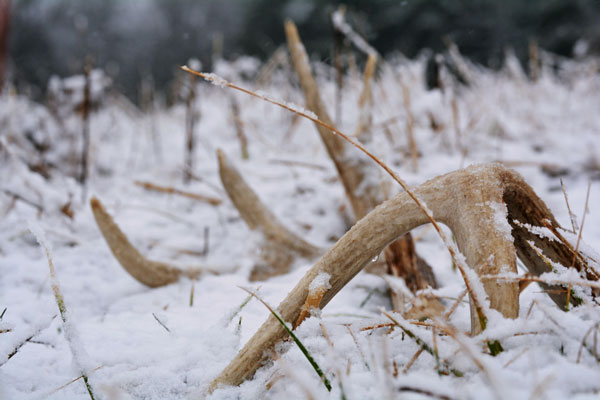
When I wrote that article, I was thinking about myself as a shed hunter. I’ve never been the big best shed hunter in the world but I like doing it. I feel like there are a lot of people like me who loves going out and go shed hunting. You get excited beforehand but sometimes it doesn’t go as you expect. I know guys that find tons of sheds every year, but then there are guys like me who don’t find a lot. When I went through that article first thing was, are you willing to put on the miles? Last year, we walked fifteen miles and there were four of us. I think we found seven sheds that day.
That wasn’t productive.
That’s not, but it is fun to be out there. That’s why I put that as the first thing, telling some people especially newer shed hunters who think that you might walk out for a couple of hours and sheds are going everywhere. That’s not typically the case.
That’s interesting you said that and I want you to follow up on this statement, you have paradise and normal. Folks, whatever the current capacity of your land is in your buck to doe ratio, that’s all you’re going to find in sheds. Sometimes you won’t because they’re not wintering on your property for a lot of reasons. Think about that and set your expectations at that level, not as Alex says, “Paradise and normal.” Unpack paradise and normal for me.
When I think of paradise, I think of the highly-groomed properties that people manage. They own a bunch of lands where it’s theirs so they lease it. They’ve got a standing crop, standing beans, late-season food products. Those properties, the guys that own those are going to find quite a few sheds. For me, I hunt on a lot of public lands, I hunt by permission. Most of the land that I hunt, some of it, deer will winter a little bit but a large majority where I’m shed hunting is not where I’m hunting. I’ve got to go out and find where deer winter and even when you find that, being in public without permission, I’m knocking on door after door trying to be able to find a few sheds. That’s what I mean is the difference between paradise and that normal.
Let’s go on to the second thing to ask yourself, are you willing to put it on the miles? You said you went fifteen miles and found seven sheds. What type of commitment does it take to get a number of sheds and get an idea of what’s on your property?
What stops a lot of people from hunting is the fear of making that jump because they don't have that security. Share on XFor me, when I’m going out and you put in the fifteen miles and you find a few sheds, it doesn’t necessarily mean that there’s not going to be deer there during the fall. Deer aren’t always wintering when you’re hunting. That leads into the second thing that I wrote about is, are you going shed hunting or scouting because there’s a difference. For me, I’ll go shed hunting and especially if I’m in an area where I will hunt in the fall. If I notice a rub or a scrape, it’s hard for me to concentrate on shed hunting. It turns into a scouting mission and then I’m not shed hunting because I have three, four or five hours go by. I realize that I even haven’t been looking for a shed that I’ve been scouting. For me, I have days set where it’s either you’re going to go shed hunting or you’re going to go scouting. Where I will go will depend on which one I’m doing.
Thanks for that and the third thing, how easily will you get discouraged?
For getting discouraged, it’s especially for people that haven’t shed hunting as much or if you’re new at it when you go out and you walk. Within the first four or five weekends I went shed hunting, I picked up two or three myself. With the number of miles, that’s not a lot. If you go out a couple of times and you don’t find any antlers, it can be tough to give up or to start scouting. If you can ask yourself beforehand how these will get you discouraged and then realize that you might not find a bunch of sheds right away or you might not find a lot at all, you’ve got to keep after it. Keep plugging away and then eventually you’ll start finding some. The more you find, the better you’ll get it seeing them. I’ve already found out with myself. I’m only 22, I’ve been shed hunting for several years and every year I’m getting better picking them up and noticing them.
Thanks for that. Let’s talk about your blog and where I found this article. Why did you start that?
It’s a funny story how I got into it. When I was eighteen or nineteen, I shot a nice buck. One of my buddies, a new guy who was an outdoor writer who has wrote for a lot of magazines talked to one of my buddies. He’s like, “You should write an article on this kid, Alex. He shot a nice buck. It’d be a great story.” The guy pretty much told me, he’s like, “I’m not just going to write one for you, but you can write one. I’ll help you and then we’ll try to get it into a magazine.” It’s where my writing career started. In high school, I was a good writer and I wrote an article, had this guy mentor me and helped me went through it. I sent it to Curt Wells, the editor of Bowhunter Magazine. He loved it and that got published. A couple of years down the road I was thinking about what I want to do for a living. I’m graduating college and I don’t want to be stuck working a 9 to 5 job the rest of my life and wondering what if. I jumped into it and started this blog and started writing a bunch. Hopefully one day, I can turn it into my full-time income.
I’ve talked to a lot of people. I’ve had Blake Alma on my show. He’s written his own book, The Hunter’s War and he’s sixteen years old. Here we are with Alex at 22 years old. The future looks bright for the outdoor industry especially from the writing side. We have men that are passionate about whitetails and passionate about the outdoors, hats off to you. I’m excited to have you on the show. You shared a little bit of the career in the outdoors but let’s expand upon that a little bit.
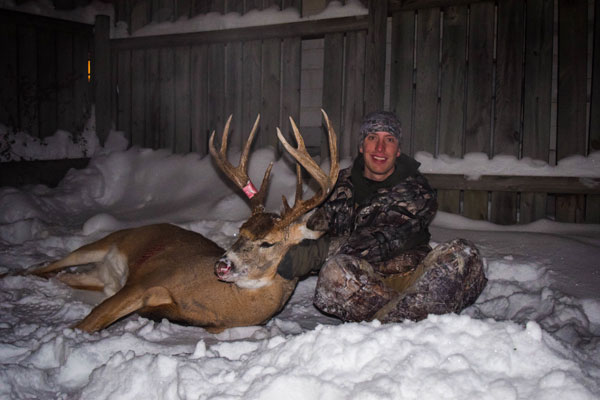
What stops a lot of people is the fear of making that jump because you don’t have that security. I’m not even to that point where I’m trying to make a dollar right now off of WhitetailDNA, but I just want to be able to do something that I love. I was listening to a podcast, the Gritty Bowmen podcast, they were interviewing Donnie Vincent. Donnie Vincent talks about, would you rather make $150,000 doing some job that you hate and that you wake up every morning dreading to go to work or would you rather make $70,000 doing something you love? Which guy is richer? That’s what I think and if I can combine doing what I love for a full-time income, it doesn’t matter how much money you make. I’d be a hundred times more happy with my life.
That’s wisdom coming from a 22-year-old. I know there are some people out there right now going, “I have to go to work because I’ve got to feed the family, I’ve got bills, I’ve got all these responsibilities.” Working someplace we don’t want is a rut and all a rut is a coffin with both ends kicked out. That’s graphic but it’s real. If you’re stuck there, take a moment, take an hour, take a day whatever you can steal and write down what you want to do when you grow up. Forget about the money. I was fortunate I worked for 30 years and I’ve been doing the podcast and I met many great people. 2017 was when we monetized. There are a lot of reasons for that and I’m good with that. After going to ATA, my business has cranked up. The phone rings, I had Dan Johnson from Nine Finger Chronicles, also the cohost of Mark Kenyon’s Wired To Hunt, he was on the show. It does get easier but you have to pay the price. What kind of prices have you paid to get where you are now?
For me, I’m not making a dollar for WhitetailDNA. I’m glad I started with what I did because I think about what my mom always tells me. She’s like, “I don’t know what I want to be when I grow up.” She’s 50. The fact that I recognized it as a younger age is nice. It’s not easy because especially with me, I’d be in school and I work two jobs while I’m in school. I’m trying to find any hour of the day to write when I can or to edit videos from this past fall from hunting. Time is something right now, I do not have a lot of it because I’d be like, “Will this be my last semester at school?” It’s busy gearing up for graduation and then when I was able to work, it’s mostly at night. Any article that you see coming from me probably were put together the previous night around midnight when I had a lot of time. That’s one thing I’ve noticed starting this, sleep became less and less but I’m okay with that. The more I can get done now and reap the benefits later that’s what ultimately makes it worth it.
Thanks for that and how do people get ahold of you?
You can visit WhitetailDNA.com and I have a contact section there, you can email me at Alex@WhitetailDNA.com. I also have a Facebook page, Instagram it’s all there for WhitetailDNA.
They’re all the same on your social media channels?
It does not matter how much money you make if you would be a hundred times more happy with your life doing what you love. Share on XIt’s all @WhitetailDNA except for Instagram, it’s @Whitetail_DNA and then Facebook and Twitter are @WhiteTailDNA.
Thanks for that, Alex. I want to give a shout-out to Whitetail Stalker, they’re our social media partner. This show is about real people in real places. Let’s talk about bowhunting and why you were passionate about it?
It’s a funny thing the way I got started in the bowhunting. I deer hunted as a kid with my dad. He was not just a huge deer hunter but more of a general all-around outdoorsman. I go deer hunting with him and it was fun and everything. We normally didn’t see much. I want to say I’m pretty sure it was Fred Eichler. I was watching Fred Eichler hunt on one of the Eastman shows back when I was fourteen. Every shot with a little six-pointer, he was pumped and he was freaking out. I thought that was cool and I ended up buying a bow. The first deer I ever shot was with a bow. I shot a little doe and I was in a ground line. She came into this little food plot that I had and it was seven yards I shot her and I watched her go down. From that moment on I never stopped. That year I shot a nice buck with my gun. From there on that was 2010, I haven’t shot another deer and I haven’t rifle hunted since then. It’s been all bow, so it’s been cool.
You mentioned your first deer. Let’s unpack that a little bit, how you got there, your shot and the emotion that you felt when you finally put that deer on the ground.
That was a cool experience because when I was hunting, it was an urban setting. I was behind this guy’s house and this guy was a big deer hunter. He didn’t hunt by his house. He hunted on Buffalo County Wisconsin. He was nice and he planted a food plot for me and it’s pretty much behind his backyard. He was a little bit of a mentor for me. He was running a trail camera and showing me how to use them. He’s putting a ground blind for me and everything and when I went hunting out there, it was one of the first times I ever went bowhunting. I was lucky with that. I had this doe come through. It was the first deer I’ve ever seen while bowhunting in my life. She came to about seven or eight yards, it was close quarters and to this day, I don’t even know how I got drawn back. She was staring right at me. I got drawn back, I put the pin on her and let the arrow fly. I remember her freak out and jumping around on the ground. I was losing my mind. She ran right into the tree line about twenty yards outside the food plot and trip over. I had some friends come out and then my dad. We got to the deer and its first time ever I got a deer. From right on then, it’s been a passion burning inside of me.
If you were going to give three or five tips, secrets to new bowhunters, what would they be.
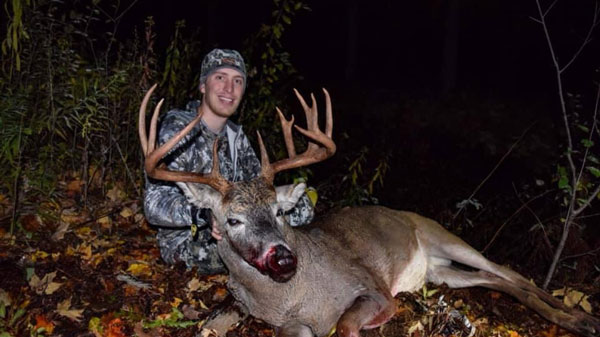
The first one would be, don’t get discouraged because it might not go your way right away. The second tip would be to learn as much as you can. What helped me was I read non-stop. In school, in class, I’d always be typing in Google, bowhunting whitetails or deer hunting or anything along those lines. I would read as much as I could. More information you can pick up right away the better off you’ll be. Another tip I’d give for a new bowhunter would be to shoot your bow a lot. When I was younger, the first I would go outside into my yard and shoot every day.
I would go out to my yard and shoot for hours upon hours. You don’t have to go that extreme. What I do think of new bowhunters should do is be comfortable with their equipment. It’s not like rifle hunting where you would put the crosshairs on the deer, shoot and they go down a lot of the time. In bowhunting, you’ve got to be a lot more accurate. You’ve got to know what you’re doing, as far as blood trailing. You’ve got to know where to hit the deer. Do you hit in the liver? You need to give it six or twelve hours? Did you double lung her or him? Those would be the first two tips I would give to a new bowhunter.
Thanks for that. You talked about DIY on public or private land. Let’s talk about that and then we’ll give some shout-outs.
As far as public land DIY, I do about 80% of my hunting on public land probably. I love the challenge with that. It is gratifying. If you hike back a mile on public property and shoot a nice buck that anybody could have done it, but you got worked pretty much everyone else. That’s a lot of fun for me. I spend a lot of time in the spring scouting. I feel every year I’m always getting new properties, whether that be door-knocking in public land. I can think of it as adding to my arsenal because a public land I thought that was good last year might not be good next year due to hunter pressure, things of that. That’s a big play there for me and it’s an added challenge. It’s a lot of fun.
When you write, how do you get the inspiration and talk about writing in general for the outdoor audience?
When I think of a topic, I like to think of timely topics, things that are going on right now. To get the inspiration for any article, I’d like to write something that I would want to read. There’s so much information out there. It’s hard to take a topic that hasn’t ever been written about. It’s about putting your spin on it, your two cents because I can write an article about three things to ask yourself before you start shed hunting. You can write the same article the next day but it will be different, if that makes sense. You’ve got to have that knowledge and you need to bring value to it. I try to think of ways that I can bring value because in the grand scheme of things, anyone that is reading anything that I write, I want them to take value out of it and learn from it. Ultimately that’s what I did and I learned from a lot of these, reading online stuff. That’s how I get my inspiration when I write.
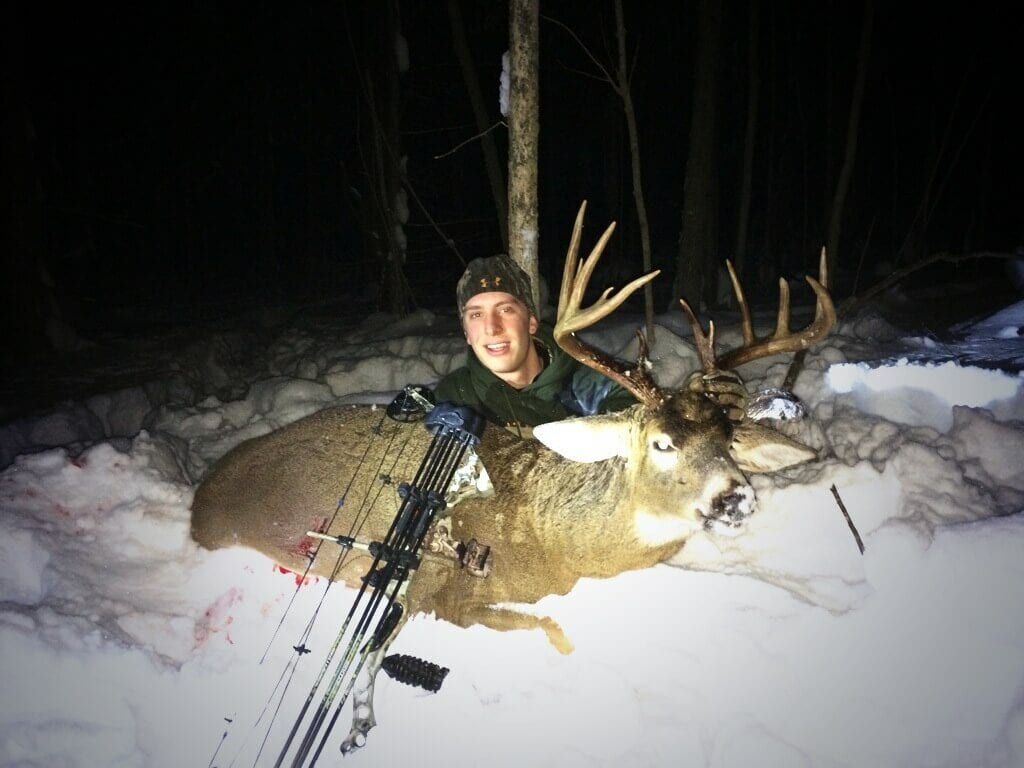
Thanks for that. We’re at the point in the show that you get a chance to give some shout-out. Get some shout-outs to the people who helped you along the way, magazines you are writing for and anybody else you want to say hi to.
I like to first thank Curt Wells and Gordon Whittington, the editors of Bowhunter Magazine and North American Whitetail for giving me a chance to write for them. Getting into those two publications was pretty special for me and reading them growing up was cool and to see my face in that. Everyone that has mentored me for hunting along the way, I’ve got a couple of buddies who pushed me to my writing career and it helped me to shape me into who I am now. If it wasn’t for my dad, I wouldn’t be a hunter in general. If I wasn’t a hunter, I wouldn’t become the deer hunter that I am now.
Alex, I want to thank you on behalf of thousands of readers throughout North America. I can’t wait to watch how your career grows over the next decade or two. I appreciate you taking your time from your college studies to share on Whitetail Rendezvous.
I appreciate it, Bruce. Thank you again for having me on.
—
The next episode of Whitetail Rendezvous is going to be special. We’re going to change it up, Mike Grandstaff from Whitetail Stalker is going to interview yours truly, the host of Whitetail Rendezvous, Bruce Hutcheon. There are a lot of twists and turns and a lot of background information about Whitetail Rendezvous going to come out on the show, so stay tuned. Subscribe, rate and review if you think I did a good job.
Important Links:
- Alex Comstock – LinkedIn
- WhitetailDNA
- Alex@WhitetailDNA.com
- WhitetailDNA.com
- Facebook – WhitetailDNA
- @Whitetail_DNA – Instagram
- @WhiteTailDNA – Twitter
- The Hunter’s War
- 3 Things To Ask Yourself Before You Start Shed Hunting – article
- Bowhunter Magazine
- Blake Alma – Past episode
- Gritty Bowmen podcast
- Donnie Vincent past episode on Gritty Bowmen podcast
- Dan Johnson – Past episode
- Nine Finger Chronicles
- Wired To Hunt
- Whitetail Stalker
- North American Whitetail
- Mike Grandstaff – next episode
About Alex Comstock
 Owner of Comstock Creative and Founder of WhitetailDNA.com.
Owner of Comstock Creative and Founder of WhitetailDNA.com.
Outdoor Writer Published in North American Whitetail Magazine, Bowhunter Magazine, Quality Whitetails and more.
